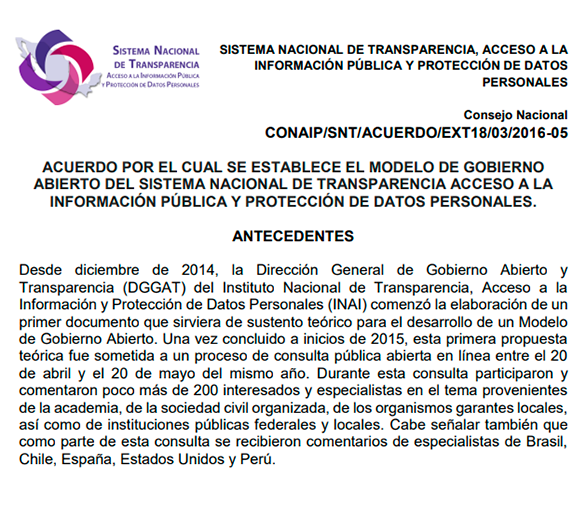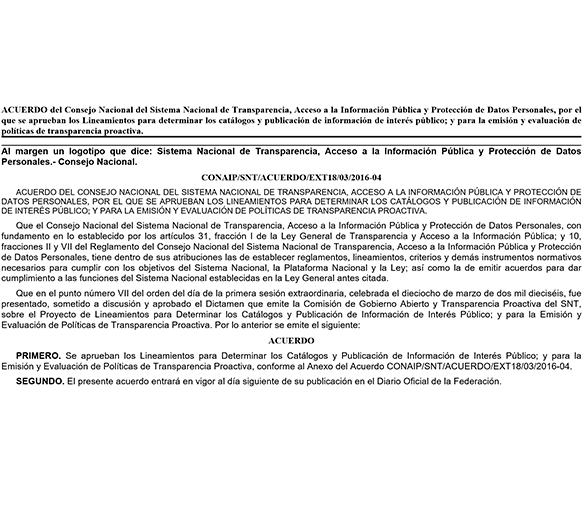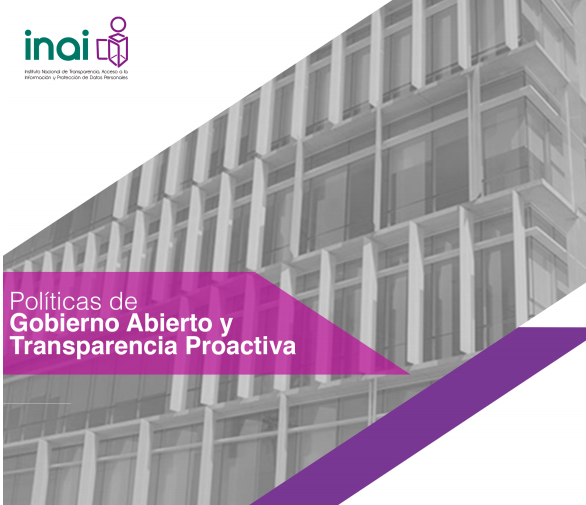
What is the INAI?
The National Institute for Transparency, Access to Information and Personal Data Protection (INAI) is the autonomous constitutional body safeguarding the compliance with two fundamental rights: access to public information and personal data protection.
Regarding the right of access to public information, INAI guarantees that any federal authority, autonomous agencies, political parties, trusts, public funds, and unions, or any individual or entity receiving or using public resources or performing acts of authority, deliver any public information requested.
Related to the right to personal data protection, INAI guarantees the appropriate use of personal data, as well as the exercise and protection of the rights of access, rectification, cancellation, and opposition that every person has regarding their information.
INAI is headed by seven Commissioners designated by the Senate of the Republic by means of citizen participation mechanisms in collaboration with civil society organizations.
What is Open Government?
Open Government is a scheme of management and generation of public policies, intended to address and collaboratively solve public problems, relying on plural and collegiate actions, whose work is based on transparency and citizen participation criteria, with the purpose of promoting an environment of social innovation and accountability.
What is Proactive Transparency?
A set of activities promoting identification, generation, disclosure, and distribution of additional information to the information deemed mandatory in the General Act, allowing the generation of useful public knowledge with a clear goal focused on the needs of determined and determinable sectors of society.
What does the General Head Office of Open Government and Transparency do?
According to Article 40 of the Organic Statute of the INAI, its functions are:
I. Prepare and coordinate documents and studies that allow the guidance, design, and implementation of the policies of the oversight bodies and regulated entities regarding proactive transparency and open government;
II. Contribute with oversight bodies of the states, regulated entities, and civil society representatives to implement proactive transparency and open government policies and mechanisms;
III. Contribute to design and implement guidelines, criteria, and methodologies necessary to verify the compliance of the state oversight bodies and regulated entities with the applicable provisions relative to proactive transparency and open government;
IV. Coordinate national and international representation of the Institute in the Open Government Partnership;
V. Promote and guide the implementation of proactive transparency and government openness models, aimed at preventing and deterring administrative failures and corruption, but especially the causes that generate them;
VI. Promote actions that contribute to the development of criteria, models, standards and good practices in proactive transparency and open government,
VII. Collaborate with the corresponding administrative units of the Institute, in the design and promotion of technological tools that allow the improvement of the quality and usefulness of public information;
VIII. Propose the construction of information sources and metrics to evaluate the effectiveness of the policies and practices of proactive transparency and open government,
IX. Implement web portals and/or civic and/or technological tools that promote policies of proactive transparency and open government;
X. Collaborate with the guarantor agencies of the states, regulated entities and representatives of civil society organizations, in the creation of web portals and/or civic and/or technological tools that promote proactive transparency and open government policies, and encourage strategic use of public information;
XI. Participate in the design and implementation of indicators that allow the evaluation of the effectiveness of proactive transparency and open government policies and practices;
XII. Prepare statements and opinions regarding the queries that regulated entities formulate, in matters of proactive transparency and open government, and
XIII. Every other resulting from the applicable regulations in the matter and those that the Plenary, the President Commissioner and the Secretary of Access to Information lay stipulate.
The fundamental basis of the work carried out by the General Head Office of Open Government and Proactive Transparency is set, regulated and documented in the three following documents:

01800.835.43.24

Office Hours: Monday-Thursday, 9:00-18:00 and Friday 09:00-15:00.

Insurgentes Sur No. 3211 Col. Insurgentes Cuicuilco, Delegación Coyoacán, C.P. 04530
Our Newsletter is the national Open Government Guide.
It is quarterly updated.
Del responsable de tratar sus datos personales
El Instituto Nacional de Transparencia, Acceso a la Información y Protección de Datos Personales (INAI o Instituto), los cuales serán protegidos conforme a lo dispuesto en la Ley General de Protección de Datos Personales en Posesión de Sujetos Obligados, y demás normatividad que resulte aplicable.
Finalidades
Los datos personales que recabaremos los utilizaremos para las siguientes finalidades:
- Enviar periódicamente un boletín con información seleccionada por el INAI para promover el derecho a la información.
- Integrar un registro de correos electrónicos para enviar invitaciones y/o eventos asociados a las materias de Gobierno Abierto, Transparencia Proactiva, Rendición de Cuentas, Participación Ciudadana, Datos Abiertos, Desarrollo Sostenible, Gobierno Electrónico e Innovación gubernamental o Cívica.
Para esta última finalidad requeriremos de su consentimiento el cual podrá manifestar al momento de registrar su correo electrónico.
Usted podrá consultar el aviso de privacidad integral en el siguiente link web: http://inicio.inai.org.mx/SitePages/Avisos-de-Privacidad.aspx
Fecha de elaboración del aviso de privacidad: 14 de septiembre de 2018.
This is a Website of the National Institute for Transparency, Access to Information and Personal Data Protection, which management is in charge of the General Head Office of Open Government and Transparency. The published information and the document collection are of open access under the terms of the following license:

This work is under the Creative Commons Attribution-Noncommercial-ShareAlike l 4.0 International License.





